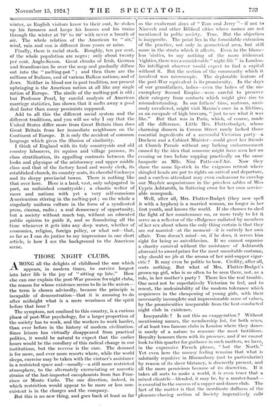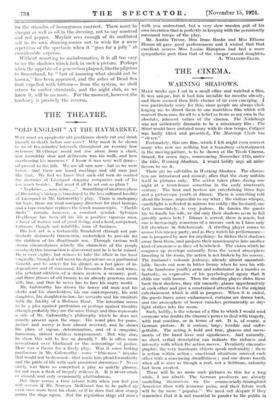THOSE NIGHT CLUBS.
../tMONG all the delights of childhood the one which appears, in modern times, to survive longest into later life is the joy of " sitting up late." How else can one explain the post-War passion for night clubs, the reason for whose existence seems to lie in the axiom— the term is chosen advisedly, because the principle is incapable of demonstration—that it is amusing to do after midnight what is a mere weariness of the spirit before that hour ?
The symptom, not confined to this country, is a curious phase of post-War psychology, for a larger proportion of the society has to work, and the workers to work harder, than ever before in the history of modern civilization. Since leisure has virtually disappeared from practical politics, it would be natural to expect that the earlier hours would be the corollary of this radical change in our institutions, but the reverse is the case. The demand is for more, and ever more resorts where, while the world sleeps, exercise may be taken with the vintner's assistance in a restricted space and—usually—a still more restricted atmosphere, to the alternately excruciating or narcotic strains of the last-imported cacophonists from San Fran- cisco or Monte Carlo. The one direction, indeed, in which restriction would appear to be more or less non- existent is in the charges and the company.
But this is no new thing, and goes back at least as far as the exuberant days of " Tom and Jerry "—if not to Nineveh and other Biblical cities whose names are not mentioned in polite society. True. But the objection is inapposite. The point lies in the formidable extension of the practice, not only in geometrical area, but still more in the strata which it affects. Even in the blame- less 'sixties, to say nothing of the more iridescent 'eighties, there was a considerable " night-life " in London.
No intelligent observer would expect to find a capital without it. But the section of the community which it involved was microscopic. The deplorable feature of the post-War equivalent is its promiscuity. In the days of our grandfathers, ladies—even the ladies of the un- exemplary Second Empire—were careful to preserve their category from contacts which might give rise to misunderstanding. In our fathers' time, matrons, anxi- ously cavaliered, might visit Maxim's once in a lifetime, as an escapade of high bravura, " just to see what it was like." But that was in Paris, which, of course, made all the difference. Little Mrs. Flutterbudget, whose charming dinners in Curzon Street rarely lacked those essential ingredients of a successful Victorian party—a Duchess and a Cabinet Minister—could greet her friends at Church Parade without any lurking embarrassment caused by the idea that someone might have seen her an evening or two before supping practically on the same banquette as Mlle. Nini Patte-en-l'Air. Now they share the same lip-stick in the exiguous retreat where shingled heads are put to rights on arrival and departure, and a careless attendant may even endeavour to envelop our Mayfair acquaintance in the priceless sables of Miss Cypris Ashtaroth, in flattering error for her own service- able musquash.
Well, after all, Mrs. Flutter-Budget (they now spell it with a hyphen) is a married woman, no longer in her first youth, and knows the world. If she chooses to shed the light of her countenance on, or more truly to let it serve as a reflector of the effulgence radiated by members of her sex about whom the only thing certain is that they are not married—at the moment—it is entirely her own affair. Tom doesn't mind—or, if he does, it serves him right for being so antediluvian. If we cannot organise a charity carnival without the assistance of Ashtaroth aforesaid to award prizes for the most unsuitable costume, why should we jib at the aroma of her mid-supper cigar- ette ? It may even be politic to bow. Civility, after all, costs nothing. But what of Mrs. Flutter-Budget's grown-up girl, who is so often to be seen there, not, as a rule, in her mother's party ? There lies the real trouble. One need not be superlatively Victorian to feel, and to resent, the undesirability of the modern tolerance which acquiesces in the cheapening of young girls, with their necessarily incomplete and impressionable sense of values, by the promiscuities inseparable from the best-conducted night club in existence.
Inseparable ? Is not this an exaggeration ? Without mentioning names, the membership list, for both sexes, of at least two famous clubs in London where they dance is surely of a nature to reassure the most fastidious. Royalty honours them with its presence, and if we cannot look to this quarter for guidance in such matters, we have, in the expressive French phrase, " lost the North." Yet even here the uneasy feeling remains that what is salutarily repulsive in Bloomsbury (not to particularize) by reason of its sheer blatancy, is discreetly present, and all the more pernicious because of its discretion. If it takes all sorts to make a world, it is even truer that a mixed clientele—blended, it may be, by a master-hand- is essential to the success of a supper and dance club. The fact of the matter is that the inordinate dullness of the pleasure-chasing section of Society imperatively calls for the stimulus of incongruous contrast. There must be vinegar as well as oil in the dressing, not to say mustard and red pepper. Mayfair sees enough of its undiluted self in its own drawing-rooms not to wish for a mere repetition of the spectacle when it "goes for a jolly" at Considerable expense.
Without resorting to melodramatics, it is all too easy to see the shadows which lurk in such a picture. Perhaps when the appetite of a generation plagued, likethe pilgrims to Samarkand, by " lust of knowing what should not be known," has been appeased, and the ashes of Dead Sea fruit expelled with bitterness from the system, we shall return to earlier standards, and the night club, as we know it, will be no more. For the moment, howevcr,the tendency is precisely the reverse.











































 Previous page
Previous page